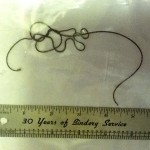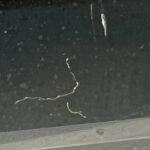There are several differences between sheep worms and horse worms. For starters certain types of worms, such as roundworms, are more likely to infect horses, while worms such as the hairworm are more likely to infect sheep. Worm that infect sheep are usually bloodsuckers,
while worms that infect horses usually feed off the contents of the animal’s intestines. Let’s begin by discussing horse worms and treatment options. After you have read about horse worms, please continue reading to learn more about sheep worms, prevention, and treatments.
Horse Worms
Worms in horses are common in horses of all ages, but some worms infect younger horses, particularly foal’s, more than others. While there are many different types of worms that infect horses of all ages, the foal will have its first encounter with the roundworm (Ascarid). Roundworms infect the foal’s body through the mouth. The foal swallows the parasite by ingesting either soil or water. Once inside the body, the roundworm will develop within 12 weeks. Once developed, the eggs hatch and the larvae begin their journey to the foal’s small intestine by traveling through the liver and lungs.
At this point, the roundworm is already dangerous. During this process, the foal is susceptible to pneumonia. Once the larvae reach the intestines, they will feed on the contents of the foal’s intestines, leeching vital nutrients daily. In addition to depleting the foal’s nutrient stores, the roundworm can also cause intestinal blockages and ruptures. Symptoms of roundworm in horses include: The roundworm can reach up to 20 inches in length if left untreated.
Roundworms in horses can be treated with two types of deworming chemicals called antiparasitics or anthelmintics. Some of these chemicals work by paralyzing the parasite, allowing the horse to expel them and other chemicals prevent nutrient consumption or limit reproductive capabilities in the parasites. This kills them or stops the life cycle. There are also a number of commercial antiparasitic compounds on the market. The more common classes include avermictins/milbimycins, benzimidazoles, and pyrimides. Anitparasitics can be purchased in paste, feed, additives, and gel form. When administered properly, all treatments are effective. Dosage is based on the horse’s weight.
Symptoms of roundworms include retarded growth, rough hair coat, pneumonia, cough/nasal discharge, pot belly, colic, and death.
Other types of worms common to horses include: threadworms, bloodworms, the botfly (infects the mouth), tapeworms, pinworms, and lungworms. Threadworms can be detected very easily. If the horse has a sudden bout with diarrhea, chances are he has threadworms. Bloodworms enter the horses body through ingested food. They travel via the blood vessels to the aorta. The aorta feeds the intestinal tract. They will mature in the intestinal tract and then make their way to the intestines to lay eggs. Bloodworms can cause inflammation, aneurysms, and colic.
Tapeworms are common during grazing season and infect the intestines and pinworms infect the colon of the horse. Lungworms infect the bronchi and the trachea and they cause constant coughing. The symptoms of worms in horses are varied. If your horse has any of the following symptoms, contact a vet.
Symptoms of Worms in Horses
Tail rubbing
Stomach ulcers
Diarrhea
Dehydration
Weight loss
Cough/nasal discharge
Anemia
Poor appetite
Rough coat
Recurrent colic
Pneumonia
Sheep Worms
There are several types of worms that infect sheep. They reside in the stomach and small intestine of the sheep, and they are bloodsuckers. Just a few of the different types of worms in sheep include the Barber pole worm (Haemonchus contortus) and the hairworm (Trichostrongylus). Both the Barber pole worm and the hairworm are common in the state of Indiana. In large numbers, these types of sheep worms can cause anemia, and they can decrease growth rate, increase susceptibility to other diseases, and lower the value of the wool due to fiber breaks and scouring.
Sheep worms have a complex life cycle. Mature worms residing within sheep shed eggs within the sheep’s feces onto the pasture. The eggs usually hatch within two to three weeks into a larval stage (L3). The L3 larval stage is then consumed by the sheep. The larvae can either develop into the mature larvae (L4) or go into a dormant stage called hypobiosis, within the sheep. The L3 larvae go into hypobiosis to survive adverse climactic conditions, such as winter. This means there are two sources that infect sheep – those that overwinter on pasture and those from animals.
Worm Prevention and How to Worm Sheep
To successfully control worms in sheep, proper timing of treatment is crucial. Thee key to controlling parasites is to prevent pasture infestation, so, strategic worming of the flock with the appropriate dewormers is crucial to winning the war on sheep worms. The four critical treatment times are: two to four weeks before lambing; before turning ewes onto spring grass; Two to four weeks before breeding, and when coming off pasture in the fall.
Dewormers have been proven to be effective in worming sheep. Dewormers approved for use in sheep include: Levamisole, Thiabendazole, Phenothiazine and Ivermectin. Prescription drugs used for sheep include Albendazole and Fenbendazole. Levamisole, Ivermectin, Albendazole, and Fenbendazole are effective against larval, adult, and larval stages in hypobiosis. Thus, they are generally the most effective agents to use. Albendazole should not be used immediately prior or after breeding, as it can prevent uterine implantation of embryos.
Management Strategies
There are many different management strategies to help control worms in sheep. Strategic deworming, using “safe” pastures for younger animals, pasture rotation, and utilizing more than one species of livestock to assist in control of parasites are some management strategies that can aid in controlling sheep worm and other parasites.
All About Worms is always free, always reader-supported. Your tips via CashApp, Venmo, or Paypal are appreciated! Receipts will come from ISIPP Publishing.















